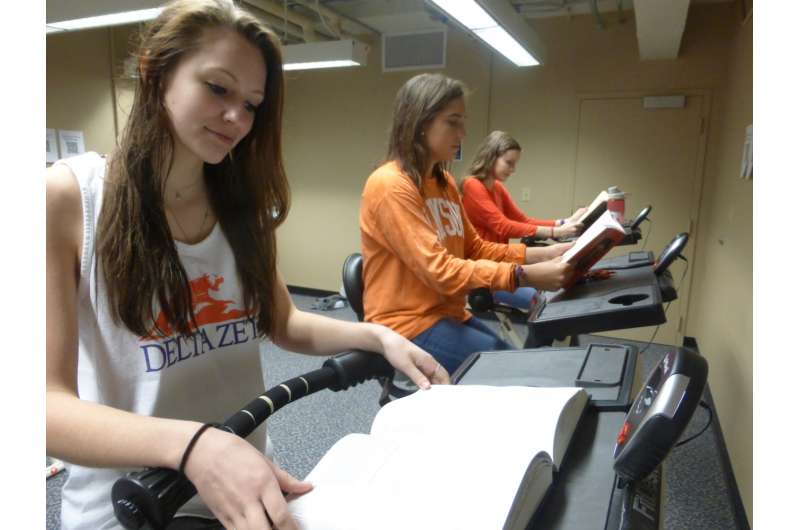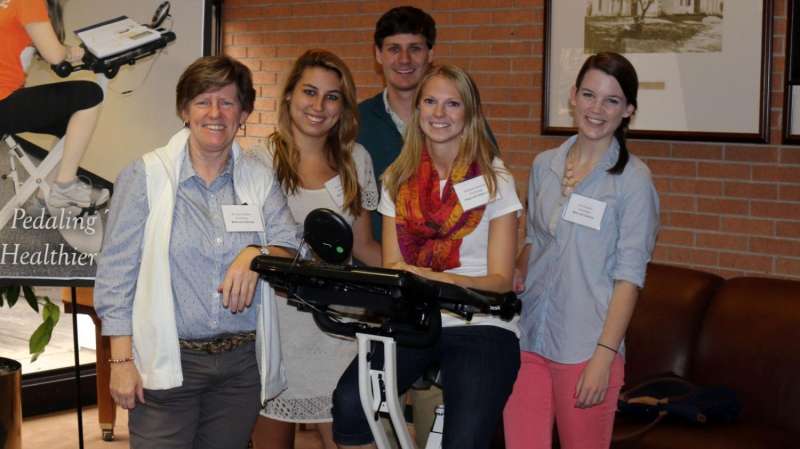Professor finds positive effects from bringing physical activity to the desk

A Clemson University psychology professor has published research revealing a positive link between mood, motivation and physical activity during work and study.
June J. Pilcher, alumni distinguished professor of psychology, studied the cognitive effects of physical activity workstations and traditional desks on Clemson student volunteers. The results of the study, published in Frontiers in Psychology, suggest the inclusion of light physical activity during work or study has positive effects without detracting from work or study effectiveness.
Pilcher wanted to determine whether or not the positive benefits associated with light exercise could be attained while working in sedentary environments. According to Pilcher, working in sedentary environments might not be harmful in the short term, but this type of behavior is related to long-term chronic disease and physical frailty.
"We hurt ourselves by working in conditions that encourage sedentary activity," Pilcher said, "but incorporating physical activity in a practical way in the workplace may actually improve physical and mental health without detracting from our ability to work or study effectively."
Pilcher first looked into treadmill workstations, but their cost, size and physical demands on the user detracted from their practical use in research or use in an office, school setting or home. She instead settled on the FitDesk Bike, an ergonomic, stationary bike and laptop workstation used in business and higher education.
Pilcher developed the study's methods along with Clemson honors alumna Victoria Baker for Baker's honors thesis. The study compared the performance of 38 Clemson students working at traditional desks and the FitDesks. Participants completed a logical reasoning task and a pattern recognition task, then completed surveys at each desk condition.

Pilcher was happy to find that complex cognitive performance was similar and stable when using the FitDesk and the traditional desk. This suggests no drawback to the use of light physical movement while at work or study. In addition, the study found that positive affect, motivation and morale increased when using the FitDesk, but not the traditional desk.
"Those findings were particularly striking to me," Pilcher said. "Improving positive affect could mean improved problem-solving, decision-making, responsibility and creativity, all important implications for the workplace."
After these encouraging results, Pilcher is continuing the study of activity workstations to break up a worker's normal routine of sedentary work. She is currently engaged in additional studies that gauge more long-term effects from the use of the FitDesk for both work and study.
The studies have become popular enough with students and faculty that FitDesks are popping up in Clemson's Brackett Hall, Cooper Library and the Academic Success Center. Pilcher hopes that one day opportunities for physical activity will be available for people in any area where people are conditioned to sit, such as doctor's waiting rooms or airports.
Pilcher has unofficially extended testing to her own office, where a FitDesk is tucked neatly into one corner. As a user herself, she understands that not all work may be conducive to a physical activity workstation, but when it comes to reading journal articles or grading student papers, she likes to break from traditional work habits.
"If there are no real drawbacks and you feel comfortable, you might as well be pedaling while you work," Pilcher said.
More information: June J. Pilcher et al. Task Performance and Meta-Cognitive Outcomes When Using Activity Workstations and Traditional Desks, Frontiers in Psychology (2016). DOI: 10.3389/fpsyg.2016.00957



















